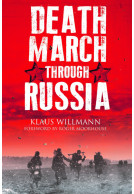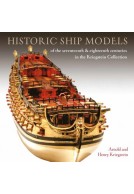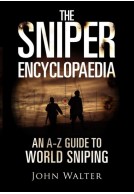Screams of the Drowning (Hardback)
From the Eastern Front to the Sinking of the Wilhelm Gustloff

Pages: 224
ISBN: 9781784385989
Published: 8th April 2021
(click here for international delivery rates)
Need a currency converter? Check XE.com for live rates
| Other formats available - Buy the Hardback and get the eBook for £1.99! | Price |
|---|---|
| Screams of the Drowning ePub (1.7 MB) Add to Basket | £6.99 |
This is the true story of how one soldier experienced the horrors and bloodshed of World War II — and lived to tell the tale.
Hans Fackler, like many boys his age, was conscripted into the Wehrmacht at the age of seventeen and sent to the Eastern Front. A pioneer in the infantry, he barely survived the carnage of the front lines and lost comrades to the Russian forces.
Eventually, Hans suffered a grievous injury from a grenade explosion. No longer able to fight, he found himself drugged on morphine and on board the controversial Wilhelm Gustloff, an armed military transport ship for SS, Gestapo and Wehrmacht personnel, which operated under the guise of transporting civilians.
The Gustloff was attacked and sunk by Russian torpedoes, drowning more than 9,000 passengers. Rescued by a German freighter, Hans recuperated in a military hospital near Erfurt in the Harz, which subsequently fell into the Russian zone. He escaped and undertook the arduous task of walking almost 200 miles back home to Bavaria.
The extraordinary first-person account of one of the few soldier-survivors of the sinking of the Gustloff, it also includes Hans’ experiences of taking part in the Kiev and the Vercors mountains massacres in 1941 and 1944 respectively.
Featured on WW2 Today
WW2 Today
"...an engaging account of one man's experience during World War II."
Nautical Research Journal - Volume 69 (2024)
Screams of the Drowning offers an engaging account of one man’s experience during the Second World War. The memoir does shed light on a little-known aspect of the war that students at all levels should find useful. Perhaps the questions it provokes will encouraging further exploration of the war on the Eastern Front.
The Northern Mariner/Le marin du nord - Vol. 32, No. 3 (Fall 2022)
I highly recommend this book to anyone who wants to learn more about the greatest maritime disaster in recorded history and to others who want to know more about the final days on the Eastern Front as seen through the eyes of a common German soldier.
Todd Shugart - Iron Cross magazine
The book follows the highs and lows of getting back even just finding food was high point. An interesting book and a good read, although and I learnt about the sinking of the Gustloff, which I probably wouldn’t have if it wasn’t for reading this book.
The History Fella
Read the Full Review Here
"...contains new eyewitness material and keen insights into the mind of German defeat."
The Saber and Scroll Journal
Hans Fackler was a private in the Pioneer Corps in the Wehrmacht in WW2, serving on the Russian Front. His distinction is that he was a survivor of the greatest maritime disaster in history, the sinking of the liner Wilhelm Gustloff in the Baltic in January 1945 with the loss of 9000 lives.
Historical Novels Review
The sinking takes up only one short chapter. Without this I doubt Hans' story would have been published, but the rest of his life is not without interest.. In one way it is interesting because it was typical of what happened to so many ordinary Germans but he also had some remarkable adventures, including his escape from a military hospital and his journey home across the chaos of Germany's final defeat. Despite the lurid title the story is told largely in Hans' unadorned prose. He has a the private soldier's genius for making the most of the most extreme and uncomfortable situations, ever grateful for a warm blanket and whatever food he can scavenge.
The extraordinary first person account of one of the few soldier-survivors of the sinking of the Gustloff I would very highly recommend it to our readers.
Shipping Today and Yesterday, October 2021
I enjoyed this book for the unique perspective and the harrowing account of a terrible sea disaster. The book is well-done and you really get a feeling for how a normal everyday soldier must have felt during the war, especially one as young as Hans. Being indoctrinated into believing that the one true way to be a man was to join the military seems like a crazy mindset to have, but war will do that to people. Hopefully this book brings awareness of the events themselves and will help show that bad things happen on every side of a conflict.
NetGalley, Stephen Kelley
This book was one that makes you sit back and put yourself in someone else's shoes.. I had not heard of the Wilhelm Gustloff before, but I am itching to read more about it now!
NetGalley, Rebecca Hill
This story is given in a first person narrative, and is so well done, you almost feel like you are there with him - on the ship, waiting to be rescued, escaping and making the long trek back home. Perfection in a book for military history lovers!
All-in-all this is one of the best first-hand accounts of the German experience of fighting on the Eastern Front that this reviewer has read. It serves to inform and entertain, a combination which is not always achieved in writing about military history. Recommended.
Phil Curme
Read the full review here
I had never heard of the Wilhelm Gustloff before and it was an informative read for me-- 9,000 people perished and only 1,252 survived. Hans Fackler, an "ordinary solider" or "Landser" similar to the American "GI," was one of the survivors. This book (translated from German to English) is an account from Hans of his time in the German forces starting from a Hilter Youth member at age 14. There was rich detail in this book, down to gruesome descriptions where his fellow officers shot other Germans at point blank range. I think this book would appeal to someone who wants to read about the life of an everyday soldier in World War II.
NetGalley, Serena Bell
Rating: 5 out of 5 stars
NetGalley, Brenda Carleton
What really strikes me most about the writing of this enthralling book is that the author has two perspectives, one as a young man of 17 and another after living several more decades, looking back. First person perspective is my favourite, too. Klaus Willmann was born in Munich and fought on the front line at the age of 17. I look at my nephews who are that age and just can't fathom it.
Willmann details his experiences in a matter-of-fact way from hunger and the morale boost of occasional hearty meals to lice infestations to war injuries to seeing men die gruesomely. He worked with dangerous land mine devices and survived the sinking of the transport ship, Wilhelm Gustoff, one of about 1,200 out of 10,000! He was on a stretcher on the ship when Russians sank it and transferred to a boat, still heavily drugged with morphine for serious injuries, and describes hearing children in boats and in the water pitifully plying their parents with questions. As the title says, he heard the screams of the drowning then and throughout his life. More unspeakable imagery. And he was still in his teens!
WWII buffs, do pick up this book. It's well worth a read for Nonfiction fans who wish to learn more about history as well.
Rating: 5 out of 5 stars
NetGalley, Joyce Fox
The title of this book, I believe, refers not only to the sinking of the Wilhelm Gustloff, but also to the everyday experience of the ordinary German soldier such as Hans Fackler was. From a Hitler youth who knew nothing of any government than Hitler's to a much wiser (at aged seventeen no less), and disillusioned soldier by the end of the war. The soldiers were very disheartened and were indeed drowning at the end of the war.
Hans was a soldier in the Wehrmacht at seventeen and immediately sent to the Eastern front. His harrowing journey took him all the way to Russia. His biographer describes the terrain and the conditions under which the men stationed there had to suffer: the filth, the hunger and the rabid Nazi-believers they encountered from time to time.
As the German effort fell apart, the men were constantly retreating with the Russians on their heels all the way. There were moments of happiness, such as finding food or escaping the enemy. There were also moments of sheer terror.
Hans was wounded badly and spent the final months of the was in a hospital.
I like the way Hans talks of the soldiers with whom he made friends. They seemed kind and generous, sharing what little they had. The book ends with Hans describing the jobs he had in post-war West Germany.
This book is a very interesting and engaging telling of one young man's experience as a Wehrmacht soldier. It is very easy to read and is footnoted to explain the German terms and slang. Mr. Willmann did a fine job in telling Hans' story.
Rating: 5 out of 5 stars
NetGalley, Anita Wallas
This is, without doubt, one of the most remarkable and memorable first hand accounts that I’ve read. In relatively recent years, I’ve come to realise that the school version of the Second World War taught in the 1950s and 60s was a very particular narrative, taught by those who’d lived through it as British subjects and many still saw Germans as the enemy. We were told of the Blitz on British cities, but reciprocal action like the bombing of Hamburg where 50000, mainly civilians, were killed in a single night, were totally ignored. I find it astonishing that a maritime disaster on an epic scale, over 9000 lost, is almost totally unknown.
Screams of the Drowning gives an often harrowing but honest account of events. The book has a very personal feel; I believe the translation is true to the original and I found the introduction really helpful in terms of putting the narrative into context.
There’s a real flow to the story, which starts with Hans Fackler’s involvement with Hitler Youth and then his pride at becoming a soldier. Experiencing the war through his eyes adds a very human dimension to the appalling experiences. The camaraderie of the young men shines through and the simplicity of the language used adds makes it very readable. It’s difficult to imagine how these young soldiers managed to survive mentally given their experiences and there are moments in the book that brought tears to my eyes. It’s a powerful and completely engaging. It’s one of the very few first hand accounts of the Wilhelm Gustloff disaster and for that alone, it’s worth reading. It’s a book which should be on every school curriculum and one which will stay with me.
About Klaus Willmann
Klaus Willmann is a forester and customs officer by profession. He discovered writing as a new vocation and has since published a number of books, including The 188 U-Boat and Death March Through Russia. Willmann lives in Grafing, near Munich.
About Roger Moorhouse
Roger Moorhouse is an historian of the Third Reich. He is the author of the acclaimed Hitler's Third Reich in 100 Objects and The Devil's Alliance, and has been published in more than 20 languages. He is also a tour guide and visiting professor at Warsaw's College of Europe. You can see him on Twitter at @Roger_Moorhouse.
About Eva Burke
Eva Burke grew up in Vienna and then Zug, Switzerland. She graduated from Brandeis University, Massachusetts with a BA and MA in Near Eastern and Judaic Studies and Contemporary Jewish Studies. She translated Screams of the Dying (Greenhill Books) and I Somehow Survived (Greenhill Books). She lives in London with her husband, four children and three grandchildren.
























